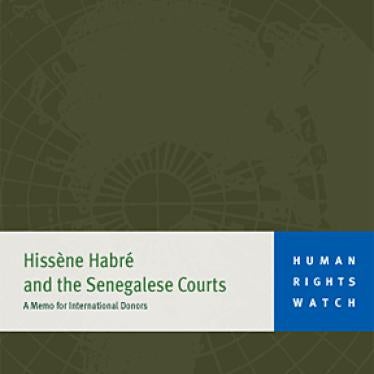(Dakar)- In the wake of Senegal’s announcement that it would place the case of former Chadian dictator Hissène Habré in the hands of the African Union (AU), Human Rights Watch insisted on Senegal’s legal obligation to prosecute or extradite Habré and called on the AU to recommend Habré’s extradition to Belgium, where he is wanted to stand trial for the most serious crimes.
Senegal's Foreign Minister Cheikh Tidiane Gadio said Sunday that Hissène Habré may remain in Senegal until AU leaders decide, at a summit in January, where he should be tried. Gadio recognized that Habré was accused of “odious crimes, even crimes against humanity,” and promised that Senegal would “abstain from any act which would permit Hissène Habré not to face justice.” He said that it was “up to the African Union summit to indicate the jurisdiction which is competent to hear the case.”
“We welcome Senegal’s promise that Hissène Habré will not escape justice,” said Reed Brody of Human Rights Watch, who coordinates the international campaign for the Chadian victims. “Indeed, having failed to prosecute Hissène Habré when it had the chance to do so, Senegal cannot avoid its legal obligation to extradite Habré. The Belgian courts, which have spent four years investigating the case, offer the best possibility for Hissène Habré to answer the charges against him in the context of a fair trial.”
The Belgian international arrest warrant, issued on September 19, charges Habré with crimes against humanity, war crimes, torture and serious violations of international humanitarian law. The files of Habré’s political police, discovered by Human Rights Watch in 2001, reveal the names of 1,208 persons who died in detention, as well as over 12,000 victims of different abuses.
On Saturday, after a Senegalese court had failed to rule on an extradition request from Belgium, Senegal’s interior minister issued an order placing Habré “at the disposition” of Nigeria’s President Olusegun Obasanjo as chairman of the African Union. On Sunday, Gadio said that Habré would stay in Senegal until the issue was considered at the next summit of the African Union, scheduled to be held in Khartoum on January 23-24.
“This case must not become a political football,” said Brody. “Habré’s victims have suffered too much and waited too long to find a court willing to listen to their suffering. Belgium is ready and able to hear the case. The African Union and Senegal must choose justice and not impunity.”
Human Rights Watch noted that the government of Chad has consistently supported Habré’s extradition to Belgium. In 2002, the Chadian justice minister wrote to the Belgian investigating judge to state that “Mr. Hissène Habré can not claim to enjoy any form of immunity from the Chadian authorities.” On Thursday, Chad’s President Idriss Déby publicly called for Habré’s extradition to Belgium.
Two weeks ago, thousands of Chadians took to the streets of N’Djamena to renew their support for the extradition of the former dictator of their country.
The chairperson of the African Union Commission, Alpha Oumar Konaré, has also spoken in favor of Hissène Habré’s extradition to Belgium.
Background
Hissène Habré ruled the former French colony of Chad from 1982 until 1990, when he was deposed by current President Idriss Déby and fled to Senegal. His one-party regime was marked by widespread atrocities. Habré periodically targeted various ethnic groups such as the Sara (1983-84), Chadian Arabs, Hadjerai (1987) and the Zaghawa (1989-90), killing and arresting group members en masse when he believed that their leaders posed a threat to his regime. Files of Hissène Habré’s political police, discovered by Human Rights Watch in 2001, reveal the names of 1,208 persons who died in detention, as well as over 12,000 victims of different abuses.
In February 2000, a Senegalese court charged Habré with torture and crimes against humanity and placed him under house arrest. But in March 2001, Senegal’s highest court said that Habré could not stand trial in Senegal for crimes allegedly committed elsewhere. Habré’s victims immediately announced that they would seek Habré’s extradition to Belgium, where 21 of Habré’s victims had filed suit. A four-year investigation by a Belgian judge resulted in an international arrest warrant against Habré on September 19, 2005 and his arrest in Senegal on November 15. On November 25, a Senegalese court ruled that it had no jurisdiction to rule on the extradition request, throwing the case into a legal limbo.






